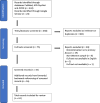The romanticisation of mental health problems in adolescents and its implications: a narrative review
- PMID: 40220194
- PMCID: PMC12396996
- DOI: 10.1007/s00787-025-02701-0
The romanticisation of mental health problems in adolescents and its implications: a narrative review
Abstract
Romanticisation is the perception and portrayal of a phenomenon as more attractive, interesting, cool, profound or desirable than it really is. There are concerns that mental health problems are increasingly romanticised, particularly among adolescents, but there is limited research on this topic. This narrative review investigated: (1) what romanticisation is in the context of adolescent mental health problems, (2) why adolescents might romanticise mental health problems, (3) the implications of romanticising mental health problems in adolescence, and (4) what interventions might reduce this phenomenon. Sixty-one publications were reviewed, including qualitative and quantitative analyses, cross-sectional and longitudinal self-report studies and conceptual reviews. Most investigated romanticisation of mental health problems online, with most researchers situated in a Western context. Identity formation, popular media influences and peer influences arose as potential explanatory factors. Negative outcomes to romanticisation were indicated, including the reinforcement of mental health problems and reduced help-seeking; few interventions to reduce the phenomenon have been proposed to date.
Keywords: Adolescents; Mental health; Online; Romanticisation.
© 2025. The Author(s).
Conflict of interest statement
Declarations. Conflict of interest: The authors declare no competing interests.
Figures
Similar articles
-
Home treatment for mental health problems: a systematic review.Health Technol Assess. 2001;5(15):1-139. doi: 10.3310/hta5150. Health Technol Assess. 2001. PMID: 11532236
-
Prescription of Controlled Substances: Benefits and Risks.2025 Jul 6. In: StatPearls [Internet]. Treasure Island (FL): StatPearls Publishing; 2025 Jan–. 2025 Jul 6. In: StatPearls [Internet]. Treasure Island (FL): StatPearls Publishing; 2025 Jan–. PMID: 30726003 Free Books & Documents.
-
Pain management for women in labour: an overview of systematic reviews.Cochrane Database Syst Rev. 2012 Mar 14;2012(3):CD009234. doi: 10.1002/14651858.CD009234.pub2. Cochrane Database Syst Rev. 2012. PMID: 22419342 Free PMC article.
-
Effects of educational and psychosocial interventions for adolescents with diabetes mellitus: a systematic review.Health Technol Assess. 2001;5(10):1-79. doi: 10.3310/hta5100. Health Technol Assess. 2001. PMID: 11319990
-
Autistic People's Experience of Empathy and the Autistic Empathy Deficit Narrative.Autism Adulthood. 2024 Sep 16;6(3):321-330. doi: 10.1089/aut.2023.0001. eCollection 2024 Sep. Autism Adulthood. 2024. PMID: 39371354
References
-
- Acheson R, Papadima M (2023) The search for identity: working therapeutically with adolescents in crisis. J Child Psychother 49(1):95–119
-
- Allison S, Warin M, Bastiampillai T (2013) Anorexia nervosa and social contagion: clinical implications. Aust N Z J Psychiatry 48(2):116–120 - PubMed
-
- Arendt F, Scherr S, Niederkrotenthaler T, Till B (2018) The role of language in suicide reporting: investigating the influence of problematic suicide referents. Soc Sci Med 208:165–171 - PubMed
-
- Arseniev-Koehler A, Lee H, McCormick T, Moreno MA (2016) # Proana: pro-eating disorder socialization on Twitter. J Adolesc Health 58(6):659–664 - PubMed
Publication types
MeSH terms
LinkOut - more resources
Full Text Sources


